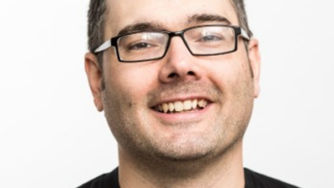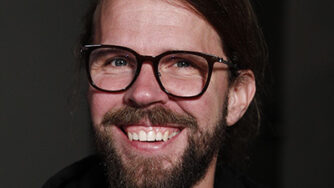Recording Venue:
Guest(s):
Host(s): Markus
Announcement regarding the release cycle.

SE Radio 163: State of the Union
Join the discussion
You must be logged in to post a comment.
24 comments
More from this show
Brian Demers, Developer Advocate at Gradle, speaks with host Giovanni Asproni about the importance of having observability in the toolchain...
Vilhelm von Ehrenheim, co-founder and chief AI officer of QA.tech, speaks with SE Radio’s Brijesh Ammanath about autonomous testing...
In this episode of Software Engineering Radio, Abhinav Kimothi sits down with host Priyanka Raghavan to explore retrieval-augmented...





I doubt any listeners will desert the show just because the release cycle is longer. This is the good thing about RSS/Podcast, the episodes come to the listener when they are ready!
For me the move to monthly productions should not effect the listeners. When i introduce my colleges to this pod cast your back is so rich in content that it take s some time to get current. keep up the good work
I am looking forward to new episodes. RSS works and even if SE radio appears only every four weeks it will be one of the most useful and enlightening software engineering resources available on the Web.
Erich
Lowering the frequency is not a problem for me, if it helps keeping quality up to standards. And, it will allow me to catch up on the older episodes 😉
Angelo @ Delphino Consultancy (NL)
Hi, no problem at all about release cycle changes – the great thing about podcasts is that people don’t need to remember to look for a new release, it just magically appears. I can’t imagine you’ll lose any subscribers.
I can also see why, after 163 episodes, it might be difficult to come up with new ideas. But looked at from a different angle, that means you’ve got an absolutely amazing and slightly bewildering library of educational material here and most developers actually have no idea it exists. You could find some time to present archived episodes in a more accessible way to new visitors (“Architecture series”, “Java series”, “Language experts series”, that kind of thing – perhaps you could actually create topic-specific RSS feeds for these) then try to do a major advertising/publicity push. This, I think, stands a chance of vastly increasing your subscriber base and therefore increases your income from sponsors and donations (which you should be less modest about requesting).
Another idea, which I’m sure is possible, is to provide a customisable RSS script which pushes out user-specified episode types in chronological order at a specified interval (every 3 days, every 7 days, whatever) starting at a specified date. You’d just need the start date and the interval in the url for this (nothing stateful, no link with user accounts), and it could be a nice way for new listeners to start working through your content.
Something I’d really like to hear in the way of format would be some round-table discussions between yourselves and groups of other experts in various fields (patterns, DSLs, databases) vaguely around topic but pretty free-flowing. Could be possible to organise this kind of thing at big conferences? It might be more fun to do and would require much less preparation (you don’t need to have a structure and a bunch of sensible questions, ideas will just bounce around). It could also be edited by someone other than the interviewer, better sharing out workload.
Just some thoughts, anyway. Keep up the good work!
My thanks to the SE-Radio team. It is world-class stuff and my friends tire of me constantly recommending it. We really appreciate all the work. Regarding frequency, take as long as you need. I thought you were going to announce a quarterly podcast, which would still be fine with me (though I prefer monthly!).
Michael Easter
http://codetojoy.blogspot.com — Putting the thrill back in blog
It is user generated content.
se-radio should become a channel for people to broadcast interviews etc that they have done themselves.
Instead of saying “join our team” simply say; “send us your episode”.
The challenge for the se-radio team is to let go of some control. You would still have control over what went to air and what didn’t -BUT you would lose micro-control.
on control:
Seriously guys, think back to the “get together” that didn’t happen. Did you ever hear the java posse asking people to submit a position paper to be able to attend their roundup? You did exactly the wrong thing! I was too far away to attend anyway, but honestly -it was a big turn off. If you want people to do stuff, don’t be scaring them off.
as middle ground….
how about you create a second se-radio show that is for these user submitted episodes -and cherry-pick the best ones to fill slots in the main channel.
Folks,
Family is more important. Do what you can, we’ll listen AND love it! I can’t find any technical podcast that touches the quality and depth of SE-Radio.
Thanks,
Craig
Dr. Craig Hollabaugh, [email protected], 970 690 4911
Author of Embedded Linux: Hardware, Software and Interfacing
http://www.embeddedlinuxinterfacing.com
I’m still playing catch up and am only on episode 60-something after discovering your podcast last year. However, I saw the title of this most recent episode and knew I should jump to the front to give it a listen. I’m glad I did.
The quality and breadth of your reporting is inspiring, and if you need to take more time between episodes, that’s fine, just please keep going! I agree that DRM leads to black market issues and will limit your listener-base, and so is not a good solution. And while I think that soliciting for more volunteers is great, it is not a full solution. The potential of a “curated” podcast where listeners send in their own episodes and you can decide if they’re of sufficient quality is a great possibility, though that might open a whole new can of worms in terms of curation responsibilities.
An additional strategy to consider is the US National Public Radio (NPR) model of pledge-drives 2-3 times a year. It doesn’t quite map isomorphically here, but the idea of getting 10% of listeners to shoulder the costs for the other 90% is actually in line with the NPR model. Which is not equitable, but if you can align yourself as a not-for-profit, some people may see a tax advantage to donation, so it creates a social engineering solution 🙂
I sincerely hope you all continue SE Radio indefinitely. I have had my eyes opened to many techniques, ideologies, and personalities that have improved my programming skills considerably. Your mission to educate does not miss the mark.
The solution is not obvious. We do have a certain brand and quality standard. We don’t just want to “republish” all kinds of things. If people are seriously interested, they should join the team. If somebody creates episodes regularly, this should be no problem. For one-offs, we think SE Radio is not the right channel.
Regarding the position paper: the reason why we did it was that we wanted to have people think a bit about how they want to participate. And it was only a page! Everybody can jot down a page of thoughts in an hour or so. I think it is fair to expect a little bit of preparation! I agree that it might have turned people off. But well, then it would not happen.
We discussed about the second channel. But we decided against it after a long discussion. If somebody wants to help us out, we want the person to join the team and be involved.
Hello Marcus and SE-Radio Team, I want to just say a few words to notify you to keep going for as long as software engineering and architecture still interests your brilliant minds. This podcast has helped me stay in many different language and architectural loops throughout my high school and University studies keeping me at the peak of each software lectures content.
And please, don’t rush the releases, like a fine spirit let your interests and thought up ideas ferment in your mind until they are ready to be released to us the audience in the form of such high quality which we have been fortunate to receive throughout this podcast’s lifetime.
If conferences come up, the usual multiple interviews on topic there while fresh with the specific fields greatest minds are also the best types of content to me. For example Simon Peyton Jones, a father of Haskell, is one such inspiration to me as a functional software engineer and DSL architect.
The current C++0x episode to me was also great, even though I have already used all of GCC and Intel ICC Compilers C++0x features in code.
So team, my opinion is to always be intrigued at the content in the episode you produce, wither new content or an overview upon old for updates to the ever-changing organic software landscape.
You will always have me and others as listeners as your podcast. I also believe your podcast is an almost perfect template for any new or other professional software engineering podcast’s to try and match and live up to.
Thank you for all the episodes so far and please continue with many more as you can comfortably fit in your team’s schedule. 🙂
Hello!
I think you could continue to interview book writers on selected topics because they’re willing to spread the ideas of his books.
Regards,
I think that you should consider re-visiting some of the topics that you covered a few years ago. In this business, nothing stays completely relevant (or at least without need of a refresher) for terribly long.
You had a show about Scala in 2007. The usefulness and robustness of the implementation are surely better now. There was a show about Erlang in 2008; the language is more important than ever now.
Ted Neward and Anders Heilsburg never fail to provide interesting material; you last had Uncle Bob on 18 months ago.
Don’t worry about repeating a subject. Almost everything has changed!
Good luck, and thanks for so many hours of useful content.
Dear SE Radio,
I’m listening to a fascinating book, called What Would Google Do,
http://www.buzzmachine.com/what-would-google-do/
Jarvis discusses free services, business models, trust, branding, customer relations, newspapers, web 2.0, control and most importantly networks (not the computer communication kind but networks of people).
I would recommend that the SE Radio team give it a listen to get inspiration to move beyond your recent 30 day release decision. SE Radio’s audience are passionate experienced developers. Who’s going to listen to 100+ hours of in-depth interviews? I mean come on for most its sleeper material, but for us it’s the best net podcast. We too have stories, can do interviews, and can contribute.
Your fear is lack of control and lower quality content. I say, set your quality bar high, publish your expectations (content/audio/time requirements), and see what we create. There has to be numerous listeners in your thousands of followers who will jump at telling their story or conduct interviews. You see, we know what type of show SE Radio is and will create content in similar fashion. You’ll be surprised.
Please consider listening to WWGD and opening up SE Radio to your network.
Thanks,
Craig
Dr. Craig Hollabaugh, [email protected], 970 690 4911
Author of Embedded Linux: Hardware, Software and Interfacing
Dear SE Radio,
I’m listening to a fascinating book, called What Would Google Do,
http://www.buzzmachine.com/what-would-google-do/
Jarvis discusses free services, business models, trust, branding, customer relations, newspapers, web 2.0, control and most importantly networks (not the computer communication kind but networks of people).
I would recommend that the SE Radio team give it a listen to get inspiration to move beyond your recent 30 day release decision. SE Radio’s audience are passionate experienced developers. Who’s going to listen to 100+ hours of in-depth interviews? I mean come on for most its sleeper material, but for us it’s the best net podcast. We too have stories, can do interviews, and can contribute.
Your fear is lack of control and lower quality content. I say, set your quality bar high, publish your expectations (content/audio/time requirements), and see what we create. There has to be numerous listeners in your thousands of followers who will jump at telling their story or conduct interviews. You see, we know what type of show SE Radio is and will create content in similar fashion. You’ll be surprised.
Please consider listening to WWGD and opening up SE Radio to your network.
Thanks,
Craig
Dr. Craig Hollabaugh, [email protected], 970 690 4911
Author of Embedded Linux: Hardware, Software and Interfacing
I just discovered SE Radio a couple of month ago and just caught up with all episodes a couple of weeks ago. Although not everything I listened to is of relevance for my professional life, I found all epsiodes to be informative as well as entertaining.
Being a spare-time podcast producer myself (on a completely different topic and not even close to SE radio in quality), I can completely understand your points such as lack of time, running out of ideas, and decreasing interest as in Markus’ case.
Although I would rather hear more episodes than less, I think you went the right way, sacrificing release frequency in order to keep the quality high!
Just a couple of thoughts: As was mentioned somewhere above, I think it might be a good idea to revisit some of the topics you already covered years ago – things tend to change quite fast in our industry. Another thing that pops to my mind is that “hands on” episode you did quite some time ago (sorry, cannot remember what exactly it was on, but I am sure you know which episode I mean) – you said it was received quite well, but never produced another hands-on-thing. Maybe there is some potential in that. Being a .net-developer myself, another very specific topic suggestion comes to my mind: What’s new in .NET 4 / Visual Studio 2010. And maybe something on developing applications for mobile devices (iPhone, Android, iPad, …) would be of interest to many listeners.
Anyway, keep up the good work!
Firstly I want to thank you all for the great podcast; I discovered SE Radio a year or so ago and was instantly addicted. I’ve just finished catching up on all of the back-episodes and I’m actually happy that you’re slowing down a bit so that I can get back to my own normal life!
As a number of people have already said, RSS means that publication frequency isn’t really a big issue, and I would add my vote for maintaining quality over quantity.
The value of SE Radio to me is that it generally provides a good introduction to a given topic and its motivational aspects (“why would you want to use this technique / language / framework?”). The software industry is way too big and varied to keep track of everything so your high-level, high-quality view of what’s going on and where the various techniques should be applied (or not!) is really useful. If I want to know more details there are plenty of other resources out there but only SE Radio gives me the information to know where the good stuff can be found.
>>We do have a certain brand and quality standard.<<
1. Get over yourselves.
and/or
2. Yes, well done! -but you have equally created an expectation of *output*.
Note: I'm only arguing because I like arguing. The only thing better than arguing is a fresh se-radio show, with a quality guest being asked questions that a lower quality show wouldn't ask.
OK you win.
=======
I concede that user generated content has no hope on se-radio. It wasn't easy in the first place -but it only works (and it does work) "if you believe" -and obviously you don't believe.
The sad thing is that you *could* have become the meta-model.
==========================================
The se-radio brand *could* have become the "approved for broadcast by the se-radio team" brand, or the "I had to submit this a couple of times and make the changes that Markus wanted before they would even list my show on the user-generated channel" brand.
The "get-together".
=============
Sorry, I didn't make the connection between your current impasse and the get-together strong enough. YES -I absolutely get that you were tryng to get the neurons firing and the conversation started, in advance of the event. But IMO -your clumsy attempt killed it! From out here, it *felt* like a freakin job-interview. And now you are doing something equally clumsy…
Zoom to the present.
==============
I really hope that you will get some volounteers at this point BUT WHO WOULD WANT TO? I am no expert in creating online 'peer-production' communities but I'm pretty sure that "please join us but only if you are prepared to make a BIG committment and not waste our time" is not the way to go!
How does open source work???
====================
People find themselves a thing to do -and it grows from there. Your concept of se-radio volounteers is WAY TOO TIGHTLY COUPLED
User generated content is…
==================
a) The only option left when you have exhausted yourselves creating content, and (thankfully) aren't built on a for-money model.
———–but much more importantly———
b) …is a potential interview with all the amazing people that *your listeners* have access to, but you don't.
I don't expect to "convert" you. I just wanted to make the case.
Honestly, the answer *is* obvious -just not to you.
Pete F
we are not recording the new massive attack album here folks
what is this “quality” thing? -the quality of se-radio is…
1. the quality of the people who are interviewed
2. the quality of the interviewer and their preparation
What would you rather listen to?
-Markus interviews Alan Kay over skype?
-Some script-bunny interviews his friend from the marketing department -in glorious, 8 channel, hi-res audio using Neumann mics -with all the coughs and farts edited out
but…
>>I think it might be a good idea to revisit some of the topics you already covered years ago – things tend to change quite fast in our industry<<
hear hear! -especially to follow up specific projects/initiatives/directions etc
Hi,
I really would like to give you the flattr for every new episode you create! A button per episode would be desirable here.
Thanks for the great work!
Johannes
Hi team,
if you like to hear, how Michael Auzenne and Mark Horstman from Manager-Tools Podcast in a similar situation discussed and solved this problem, just listen to
http://www.manager-tools.com/2006/07/1st-anniversary-cast
Regards,
Axel
I agree that reducing the frequency is not a problem. I’ve subscribed to the podcast and whenever something is released I will get it. No worries.
Hi Folks,
Just to let you know that I really appreciate the podcasts – a great way to keep up-to-date with technology trends. To put my money where my mouth with, I’ve signed up for the $3pm subscription too, which is a bargain by anybody’s standards.
2015 now & listening to the back-catalog. Glad to see this is still going strong with a new episode posted today. Keep up the great work.